German actor Fritz Wagner (1915-1982) was a handsome star in the European cinema of the 1940s and 1950s. From 1938 to 1976, he appeared in more than sixty films and TV productions, both in Eastern Germany and in West-Germany.
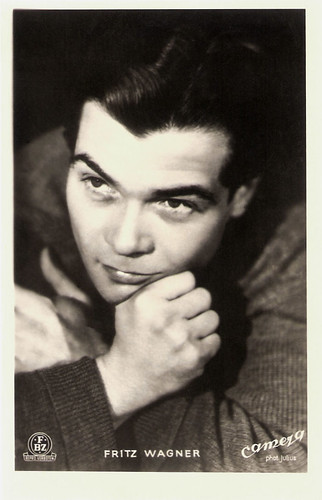
German postcard by Film Bild Zentrale (FBZ). Photo: Julius / Camera.

German postcard by Film-Foto-Verlag, no. C 187. Photo: Star-Foto-Atelier / Tobis. Publicity still for Der Erbförster/The hereditary ranger (Alois Johannes Lippl, 1945).

German postcard by Kitt Fotokarten, München. Photo: Kurt Julius / Camera Film / Herzog. Publicity still for In jenen Tagen/Seven Journeys (Helmut Käutner, 1947).
Friedrich Karl Wagner was born in 1915 in Heilbronn, Baden-Württemberg, Germany. His father, Karl Friedrich Wagner, worked in a cinema.
Fritz attended drama classes from Elly Förster. Then followed first parts in the theatres in Stuttgart, München and Berlin, at the Volksbühne and Hebbel-Theater. In 1938, Fritz started his film career with bit roles, including one in the Nazi propaganda film Stukas (Karl Ritter, 1941).
Wagner played supporting roles in the drama Mit den Augen einer Frau/With the Eyes of a Woman (Karl Georg Külb, 1942) starring the sisters Ada and Olga Tschechowa, and the comedy Sophienlund (Heinz Rühmann, 1943) starring Harry Liedtke.
After the war, he played a leading role in the drama Freies Land/A Free Country (Milo Harbich, 1946) the second film of the newly founded DEFA studio in the Soviet occupation zone which later became East Germany. The propaganda film portrayed the effects of land reforms brought in by the Soviet authorities.
It would be the only DEFA film until the mid-1950s that dealt with the hardships of East-Germany's rural life, and was heavily influenced by the Italian Neorealism of that time. Most people in the film weren't professional actors but farmers. The film proved to be very unsuccessful on its release.
Between 1946 and 1949, Wagner was also one of the faces of the West-German Trümmerfilme, produced in Hamburg in the British Zone in the wake of Germany's defeat during World War II. He appeared in one of the episodes of In jenen Tagen/Seven Journeys (Helmut Käutner, 1947), about the story of a car and its seven owners during the years of the Third Reich.
The film's objective was to highlight the private resistance of various figures to the Nazis even while they publicly accepted the repression of Nazi society. In jenen Tagen was well received by the German public and gives an early display of the talent of Helmut Käutner, who both directed and wrote the film.
Wagner also had a supporting part in the romantic comedy Film ohne Titel/Film Without Title (Rudolf Jugert, 1948), starring Hans Söhnker and Hildegard Knef. It is an interesting reflection about the rights to be entertained after WWII: which stories can be told, when all stories seem to have been finished? It shows the attempts of a film crew to shoot a film.
Herbert Schwaab at IMDb: "The film is entertaining and modern as well. Unfortunately questions of film form were not to be touched again until the seventies." For the DEFA, he also played a leading role in the war drama Die Brücke/The Bridge (Arthur Pohl, 1949), and in Der Kahn der fröhlichen Leute (Hans Heinrich, 1950) which sold more than 4,100,000 tickets.

German postcard by Film-Foto-Verlag, no. A 3749/1, 1941-1944. Photo: Star-Foto-Atelier / Tobis.
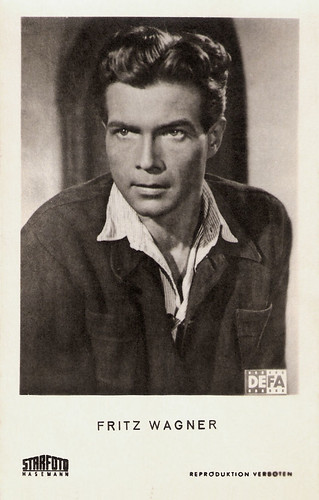
German postcard by Starfoto Hasemann. Photo: DEFA. Publicity still for Freies Land/A Free Country (Milo Harbich, 1946).
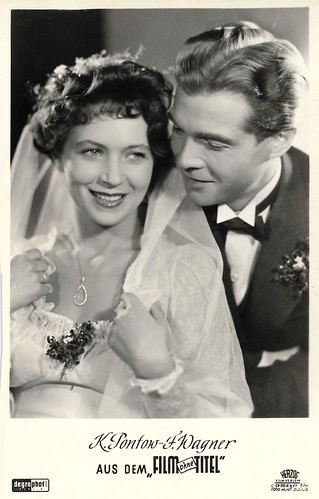
German postcard by Degro Phot., Berlin, no. C 187. Photo: Herzog Filmverleih / Camera Film / Kurt Julius. Fritz Wagner and Käte Pontow in Film ohne Titel/Film Without Title (Rudolf Jugert, 1948).

German postcard by Film Bild Zentrale (FBZ). Photo: Niess.
During the 1950s, Fritz Wagner was one of the well known faces of the German and Austrian cinema. He starred opposite Ingrid Lutz in the crime film Großstadtgeheimnis/Big City Secret (Leo de Laforgue, 1952).
He often had supporting parts such as in the satire Der Hauptmann und sein Held/The Captain and His Hero (Max Nosseck, 1955) or in Eine Frau genügt nicht?/One Woman Is Not Enough? (Ulrich Erfurth, 1955), with Hilde Krahl and Hans Söhnker.
At the end of the 1950s, his roles became smaller. His later films include the crime drama Banktresor 713/Bank Vault 713 (Werner Klingler, 1957) with Martin Held and Hardy Krüger, and the crime film Der Greifer/The Copper (Eugen York, 1958) with Hans Albers.
His final feature film was the Theo Lingen comedy Bei Pichler stimmt die Kasse nicht/Pichler's Books Are Not in Order (Hans Quest, 1961).
During the 1960s he worked for television, and he was last seen on screen in the mini-series Alle Jahre wieder: Die Familie Semmeling/Every year again: the Semmeling family (1976). From 1945 on, Wagner worked often for the radio, and appeared in many radio plays till 1970. He also gave acting classes.
Wagner was probably homosexual. Gottfried Lorenz describes in his book 'Töv, di schiet ik an: Beiträge zur Hamburger Schwulengeschichte' how he was named in a 'theatre scandal' around actor Karl Stoll in 1941 and 1942. I guess his sexuality probably hurt his film career during the 1950s.
Fritz Wagner died of cancer in 1982 in Bonn, North Rhine-Westphalia, West Germany. He was 66.

German postcard by Film-Foto-Verlag, no. A 3841/1, 1941-1944. Photo: Baumann / Ufa.
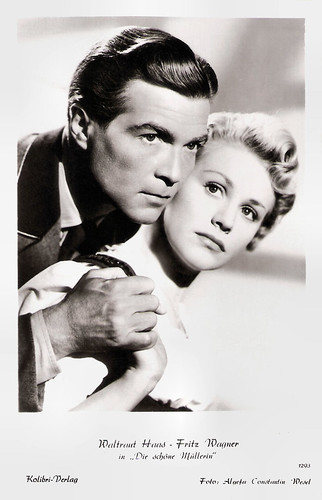
German postcard by Kolibri-Verlag, no. 1293. Photo: Algefa / Constantin / Wesel. Publicity still for Die Schöne Müllerin/The beautiful Miller (Wolfgang Liebeneiner, 1954) with Waltraut Haas.
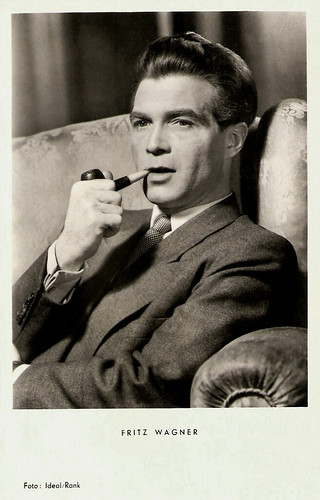
German postcard by Kunst und Bild, Berlin, no. A 389. Photo: Ideal / Rank.

German postcard by Kunst und Bild, Berlin, no. T 820. Photo: Wega / Gloria-Film / Bayer. Publicity still for Das alte Försterhaus/The old forester's house (Harald Philipp, 1956).
Sources: Gottfried Lorenz (Töv, di schiet ik an: Beiträge zur Hamburger Schwulengeschichte), Wikipedia (German) and IMDb.

German postcard by Film Bild Zentrale (FBZ). Photo: Julius / Camera.

German postcard by Film-Foto-Verlag, no. C 187. Photo: Star-Foto-Atelier / Tobis. Publicity still for Der Erbförster/The hereditary ranger (Alois Johannes Lippl, 1945).

German postcard by Kitt Fotokarten, München. Photo: Kurt Julius / Camera Film / Herzog. Publicity still for In jenen Tagen/Seven Journeys (Helmut Käutner, 1947).
One of the faces of the West-German Trümmerfilme
Friedrich Karl Wagner was born in 1915 in Heilbronn, Baden-Württemberg, Germany. His father, Karl Friedrich Wagner, worked in a cinema.
Fritz attended drama classes from Elly Förster. Then followed first parts in the theatres in Stuttgart, München and Berlin, at the Volksbühne and Hebbel-Theater. In 1938, Fritz started his film career with bit roles, including one in the Nazi propaganda film Stukas (Karl Ritter, 1941).
Wagner played supporting roles in the drama Mit den Augen einer Frau/With the Eyes of a Woman (Karl Georg Külb, 1942) starring the sisters Ada and Olga Tschechowa, and the comedy Sophienlund (Heinz Rühmann, 1943) starring Harry Liedtke.
After the war, he played a leading role in the drama Freies Land/A Free Country (Milo Harbich, 1946) the second film of the newly founded DEFA studio in the Soviet occupation zone which later became East Germany. The propaganda film portrayed the effects of land reforms brought in by the Soviet authorities.
It would be the only DEFA film until the mid-1950s that dealt with the hardships of East-Germany's rural life, and was heavily influenced by the Italian Neorealism of that time. Most people in the film weren't professional actors but farmers. The film proved to be very unsuccessful on its release.
Between 1946 and 1949, Wagner was also one of the faces of the West-German Trümmerfilme, produced in Hamburg in the British Zone in the wake of Germany's defeat during World War II. He appeared in one of the episodes of In jenen Tagen/Seven Journeys (Helmut Käutner, 1947), about the story of a car and its seven owners during the years of the Third Reich.
The film's objective was to highlight the private resistance of various figures to the Nazis even while they publicly accepted the repression of Nazi society. In jenen Tagen was well received by the German public and gives an early display of the talent of Helmut Käutner, who both directed and wrote the film.
Wagner also had a supporting part in the romantic comedy Film ohne Titel/Film Without Title (Rudolf Jugert, 1948), starring Hans Söhnker and Hildegard Knef. It is an interesting reflection about the rights to be entertained after WWII: which stories can be told, when all stories seem to have been finished? It shows the attempts of a film crew to shoot a film.
Herbert Schwaab at IMDb: "The film is entertaining and modern as well. Unfortunately questions of film form were not to be touched again until the seventies." For the DEFA, he also played a leading role in the war drama Die Brücke/The Bridge (Arthur Pohl, 1949), and in Der Kahn der fröhlichen Leute (Hans Heinrich, 1950) which sold more than 4,100,000 tickets.

German postcard by Film-Foto-Verlag, no. A 3749/1, 1941-1944. Photo: Star-Foto-Atelier / Tobis.

German postcard by Starfoto Hasemann. Photo: DEFA. Publicity still for Freies Land/A Free Country (Milo Harbich, 1946).

German postcard by Degro Phot., Berlin, no. C 187. Photo: Herzog Filmverleih / Camera Film / Kurt Julius. Fritz Wagner and Käte Pontow in Film ohne Titel/Film Without Title (Rudolf Jugert, 1948).

German postcard by Film Bild Zentrale (FBZ). Photo: Niess.
Big City Secret
During the 1950s, Fritz Wagner was one of the well known faces of the German and Austrian cinema. He starred opposite Ingrid Lutz in the crime film Großstadtgeheimnis/Big City Secret (Leo de Laforgue, 1952).
He often had supporting parts such as in the satire Der Hauptmann und sein Held/The Captain and His Hero (Max Nosseck, 1955) or in Eine Frau genügt nicht?/One Woman Is Not Enough? (Ulrich Erfurth, 1955), with Hilde Krahl and Hans Söhnker.
At the end of the 1950s, his roles became smaller. His later films include the crime drama Banktresor 713/Bank Vault 713 (Werner Klingler, 1957) with Martin Held and Hardy Krüger, and the crime film Der Greifer/The Copper (Eugen York, 1958) with Hans Albers.
His final feature film was the Theo Lingen comedy Bei Pichler stimmt die Kasse nicht/Pichler's Books Are Not in Order (Hans Quest, 1961).
During the 1960s he worked for television, and he was last seen on screen in the mini-series Alle Jahre wieder: Die Familie Semmeling/Every year again: the Semmeling family (1976). From 1945 on, Wagner worked often for the radio, and appeared in many radio plays till 1970. He also gave acting classes.
Wagner was probably homosexual. Gottfried Lorenz describes in his book 'Töv, di schiet ik an: Beiträge zur Hamburger Schwulengeschichte' how he was named in a 'theatre scandal' around actor Karl Stoll in 1941 and 1942. I guess his sexuality probably hurt his film career during the 1950s.
Fritz Wagner died of cancer in 1982 in Bonn, North Rhine-Westphalia, West Germany. He was 66.

German postcard by Film-Foto-Verlag, no. A 3841/1, 1941-1944. Photo: Baumann / Ufa.

German postcard by Kolibri-Verlag, no. 1293. Photo: Algefa / Constantin / Wesel. Publicity still for Die Schöne Müllerin/The beautiful Miller (Wolfgang Liebeneiner, 1954) with Waltraut Haas.

German postcard by Kunst und Bild, Berlin, no. A 389. Photo: Ideal / Rank.

German postcard by Kunst und Bild, Berlin, no. T 820. Photo: Wega / Gloria-Film / Bayer. Publicity still for Das alte Försterhaus/The old forester's house (Harald Philipp, 1956).
Sources: Gottfried Lorenz (Töv, di schiet ik an: Beiträge zur Hamburger Schwulengeschichte), Wikipedia (German) and IMDb.
No comments:
Post a Comment